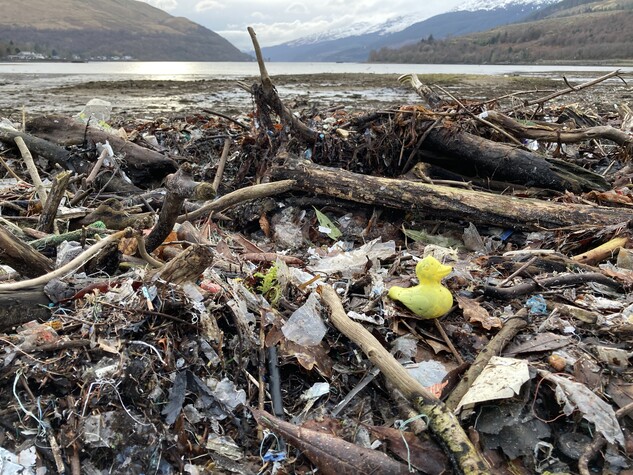Working towards solutions for the Arrochar Litter Sink

Proposal code: AP-2025-06-116
To develop affordable technology capable of removal and separation of mixed materials at the Arrochar Litter Sink for the benefit of the local community, visitors and the environment.
Estimated Price
27000
The GRAB Trust is keen to bring a Challenge to CivTech Round 11: HOW CAN TECHNOLOGY REDUCE THE ENVIRONMENTAL AND SOCIAL ISSUE OF LITTER AT ARROCHAR?
Due to a combination of factors, marine borne plastics/litter accumulates unevenly along coastlines with some places developing into what are referred to as "litter sinks." The GRAB Trust is seeking funding partners to take part in CivTech to develop a solution to deal with the mixed debris we find at Arrochar. The head of Loch Long has suffered from a worsening litter problem for decades. Lifetime resident of Arrochar, Mary Haggarty (1942-2022) wrote this account in September of 2022: "By the sixties and seventies, it was very apparent litter was coming up the loch. Various groups have, over the years tried keeping the shore around Arrochar clear of litter - but it is an ongoing issue. Up until a number of years ago, the council undertook the heaviest of the clearance, removal and covered fees for landfill, which was appreciated. When this stopped the Community Council managed to secure grant funding to cover the cost of mechanical clearing, but not the landfill, so the litter was buried at the head of the loch. This resulted in the Community Council being reported to Marine Scotland, which led to the Scottish Government designating Arrochar a Litter Sink in 2017 and allocating £500K to carry out survey work to find a permanent solution to the problem." An illustration of Mary's account can be seen at Waste Stories.
That funding has come to an end. We know where the litter is coming from but are no closer to finding a permanent solution and the problem continues to get worse. The two most recent MCS surveys show 53,000 and 65,000 litter items/100 m. The national average is 170 litter items /100m (MCS beachwatch data 2024, from 1200 surveys (including the 2 at Arrochar)).
Currently the only way to deal with the scale of the littering we find is by mechanically 'clearing' the head of the loch. Heavy machinery is used to fill trucks with hundreds of tonnes of seaweed mixed with litter which is sent to landfill. This is prohibitively expensive as the resulting mixture is extremely heavy. Quotes to carry this out in 2024 totaled £55K for a single 'beach clean.' Using this method means that all the natural materials are also stripped from the shoreline and end up in landfill, generating methane. Additionally the Scottish Government intends to introduce a ban on sending biodegradable municipal waste (BMW) to landfill in January 2026.
Without a method of removing the accumulations of litter/waste ending up here and separating or otherwise dealing with this material, plastics will remain on the beach, continue breaking down into micro plastics, ending up in the food chain. The Clyde is an active commercial fishery and is popular with anglers and hobby fishermen. A news article by Deutche Welle provides recent video footage of Arrochar's plight.
We don't currently have a technological solution that allows us to separate the materials at the appropriate scale in an affordable way and this is what we hope to develop through CivTech - A Scottish Government programme that brings the public, private and third sectors together.
1. The Challenge is defined and set (open to any organisation, team or individual - we seek truly inventive & ambitous approaches, coupled with the knowledge, expertise and know how to bring the challenge to fruition).
2. Applications assessed, shortlisted proposals proceed to exploration, and are developed further.
3. The best go through to the accelerator - 4 months of intensive work to create the solution.
This challenge has been presented to CivTech's Programme Director and Chief Digital Officer. CivTech is happy to support the Challenge (demonstrating belief in the potential of this project). This means that the Scottish Government would match fund our sponsor's funding - the main caveat would be that we involve the Robotarium, which is extremely positive as this could entice some interesting robotics companies and potentially further funding and additional support.
- The total cost of the one year Challenge (up to precommercial stage): £27K
- Funds pledged so far from local third sector and private sector partners: £13.5K
- Additionally, GRAB has submitted further funding applications for this purpose and await decisions on these.
- GRAB also commits Project Officer hours and has the support of Marine Scotland employees involved in the previous government research and hopes to build on this knowledge base.
The development of technology to deal with the Arrochar Litter Sink would be truly transformational for the area and in addition to the enormous environmental benefits, the local residents could reclaim a sense of pride in their shore front and village. Beached marine litter, despite being everybodies problem does not fall directly under any one organizations area of financial responsibility.
